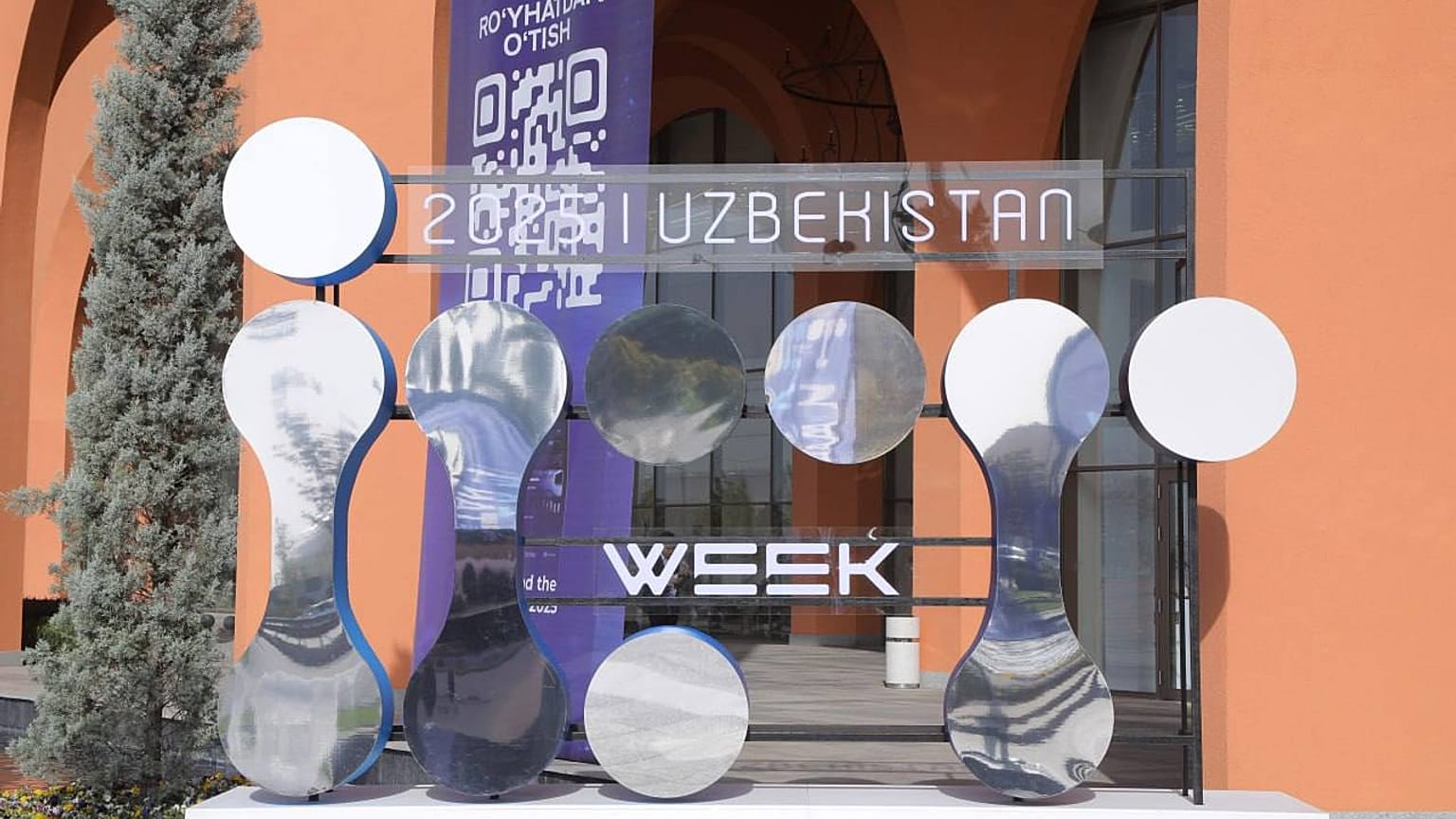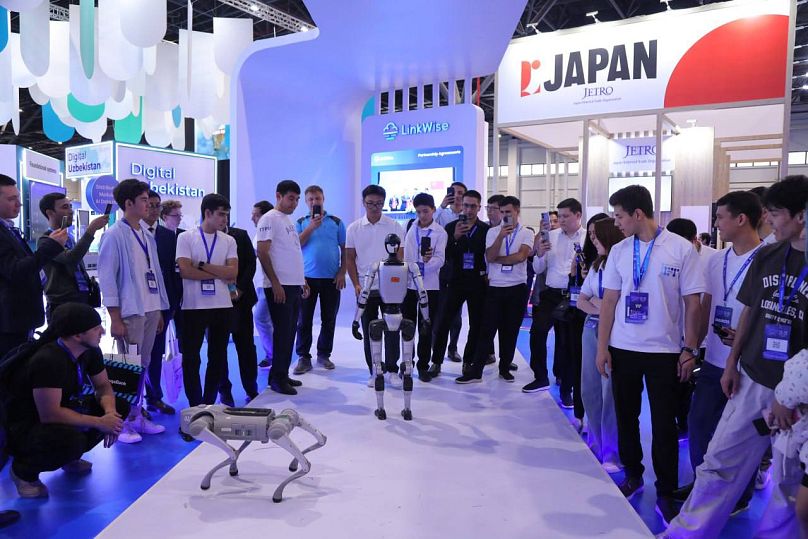ICT Week 2025 reveals Uzbekistan’s ambition: AI for dignity, opportunity, and global recognition in the digital economy.
Before 2022, artificial Intelligence (AI) wasn't accelerating at quite the same pace it is today. Now, it is reshaping economies, societies, and international cooperation. From finance to medicine and space technology, AI has become the new frontier — but without robust digital infrastructure, talent, and regulation, no country can fully harness its potential.
This year, Central Asia is emerging as one of the regions to watch. With Uzbekistan hosting its largest-ever ICT Week in 2025 - gathering more than 20,000 participants, 300 companies, and delegations from over 50 countries - the region is positioning itself as a digital hub connecting Europe, Asia, and the Middle East.
Uzbekistan’s ambition: AI for dignity and opportunity
For Uzbekistan, digital transformation is not only about technology, but about people.
“Our President has first and foremost promoted the idea of ‘For the Dignity of the Human Being'. We all talk about artificial intelligence, but the focus should be on making people’s lives easier and creating opportunities for additional income,” Uzbekistan's minister of digital technologies, Sherzod Shermatov, told Euronews.
He points to the country's demographic advantage: a growing youth population, with nearly one million children born last year.
“In developed countries, birth rates are low. For us, the priority is creating job opportunities for young people so they can earn income here, instead of going abroad,” he said.
According to the ministry, more than 100 AI projects are already underway in areas ranging from education and healthcare to banking, customs, and industrial production. The goal: improve efficiency, expand digital government services, and generate new employment.
Global recognition: ITU sees Uzbekistan “leading the way”
The transformation has not gone unnoticed internationally. The International Telecommunication Union (ITU), a United Nations body that develops global ICT standards, praised the country’s progress.
“Uzbekistan is a giant. It is leading the way, particularly in this region but also beyond, because connectivity is very high, the policies are very positive, and the vision here is driving the sector to new heights,” Cosmas Luckyson Zavazava, the ITU's director of the telecommunication development bureau, told Euronews.
He stressed that connectivity remains the foundation of AI. “Without connectivity and without data, there is no Artificial Intelligence. That is why infrastructure and local content are so important,” he added, noting Uzbekistan’s progress in gender parity and youth participation.
Uzum: Uzbekistan’s unicorn in fintech and e-commerce
Uzbekistan’s tech scene is producing a number of notable success stories. Uzum is one such company which combines an online marketplace with a fast-developing fintech ecosystem.
“On emerging markets, it’s not enough to build a marketplace - you also have to build seamless payment solutions. Forty per cent of our marketplace turnover comes through our fintech products like Uzum Nasiya and Uzum Bank,” the company’s Chief Operating Officer, Roman Lavrentiev, explained.
This year in August, Uzum raised over €59.6 million from Tencent, a leading Chinese technology conglomerate best known for WeChat, and VR Capital, an international investment firm specialising in emerging markets and distressed assets, and FinSight Ventures reaching a valuation above €1.38 billion.
“This shows it is possible to build a unicorn on Uzbek soil. Uzbekistan is in the middle of an economic spring, and international investors are taking notice,” he said.
Building the infrastructure: DataVolt bets big
Private investors are also putting down long-term bets. DataVolt, a global digital infrastructure company, is constructing one of Central Asia’s most advanced data centres in Tashkent.
“There is a reason why we have chosen Uzbekistan as a hub for Central Asia in digital infrastructure and AI,” explained Adam Malsagov, DataVolt’s Business Development Director.
“The regulatory environment, technical progress, and economic incentives have created confidence for large-scale investors like us”.
The project is being built at record speed — agreements signed last year, construction already underway, and launch planned by the end of 2026. More importantly, the company is training talent. Through its DataVolt Academy, 30 local students have joined the team and will graduate as advanced AI specialists within two years.
IT exports surpass €850 million
The ecosystem is expanding beyond infrastructure. According to IT Park, Uzbekistan exported more than €765 million in IT services in 2023, a figure expected to surpass €850 million in 2025.
“Today, we have not only Uzbek start-ups but also foreign start-ups establishing their technical offices in Uzbekistan. The main criterion is presence here, and then they can access our support programs,” said Makhliyo Mukhsinova, IT Park's director of services export development.
ICT Week itself hosted more than a dozen startup pitches, with investors from 85 countries attending.
“We are supporting local and foreign startups alike, especially in artificial intelligence, e-commerce, and outsourcing. This is about building an ecosystem that attracts global capital,” Mukhsinova added.
Central Asia’s role in the global digital future
Uzbekistan’s transformation is part of a larger regional trend. The country’s ICT services expanded by more than 120 per cent in 2024, while its exports of IT services reached about €312 million.
The government has digitised over 760 public services, used by around 10 million citizens, and is investing heavily in infrastructure — including plans to install 6,000 new base stations and lay 30,000 km of fibre-optic cables to reach near-universal coverage.
Across Central Asia, digital momentum is also strong. In Kazakhstan, IT service exports through platforms like Astana Hub have reached over €400 million in one recent period, alongside the rapid expansion of its digital infrastructure.
For Europe and the Middle East, this matters. The region is becoming a bridge for digital trade, data infrastructure, and AI innovation — offering both new markets and new partners.
And as ITU’s director put it: “Although Uzbekistan is landlocked - even doubly landlocked - it’s making great progress in transforming sectors using digital, particularly focusing on youth. That investment in people is what will drive the future”.





















